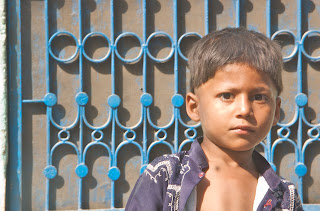 Had a great talk with my friend, Eric, Saturday night about the concept of small.
Had a great talk with my friend, Eric, Saturday night about the concept of small.I can't think of one society in this world that equates smallness with greatness. But Jesus did. He told us point-blank that the least in His kingdom would be greatest, and that those who drive for first place would find themselves at the end of the line.
Take a look at the picture. The words "precious," "cute," or "sad" may pop into your head when you see this boy. But what about "great" or "enviable"? This kid lives in a slum in India, where 40 percent of the world's poor people live. Do you think he thinks of himself as great or enviable?
I think Jesus does.
Jesus chose the small and the unworthy to do his work during his time on earth, and he still does. However, when we Christians in America think about being effective for the kingdom, we think big. We're addicted to big -- big stores, big cars, big plans, big bang for the buck. Small doesn't suit us. Small isn't worthy of our attention. We don't like being small, we don't like being thought of as small, and we don't do small.
But Jesus does.
 Jesus said that his kingdom (the worldwide community of Jesus-followers) is like a mustard seed, which is about a millimeter wide but grows to a height of 3 to 8 feet, depending on variety, soil, etc. Jesus also compared his community of followers to yeast, a single-celled fungus that does its work slowly but steadily in all kinds of roles, from making bread rise to fermenting wine to decomposing fallen fruit.
Jesus said that his kingdom (the worldwide community of Jesus-followers) is like a mustard seed, which is about a millimeter wide but grows to a height of 3 to 8 feet, depending on variety, soil, etc. Jesus also compared his community of followers to yeast, a single-celled fungus that does its work slowly but steadily in all kinds of roles, from making bread rise to fermenting wine to decomposing fallen fruit.Nothing about mustard seeds or yeast is impressive. They are small, insignificant-looking objects. They don't look nearly as strong or capable as bricks or blocks of stone. But Jesus didn't compare his kingdom to big, impressive-looking things, did he? He placed great stock in the small -- good thing, too, or else all of us would be on the curb.
The next time you think about making a big impact for the kingdom, don't make big plans. Think about finding a small place in God's big story. Let him do big. Comparatively speaking, we're all just mustard seeds waiting to be planted somewhere useful.








